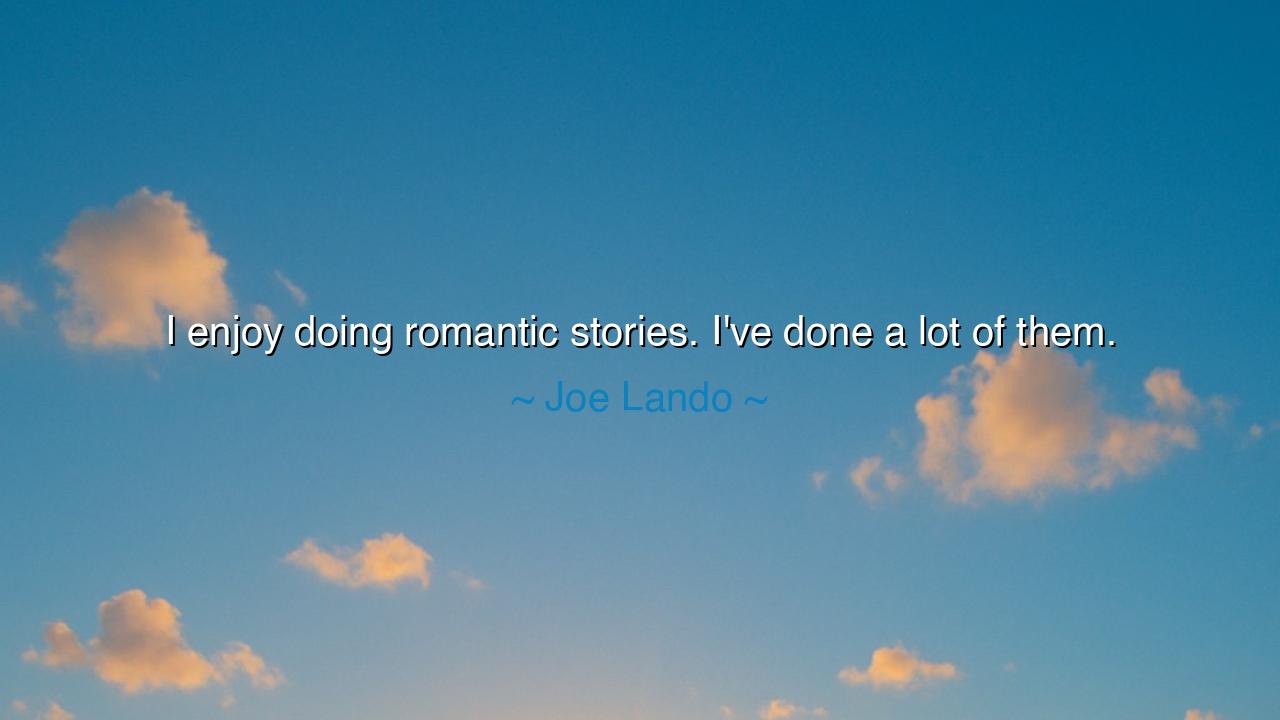
I enjoy doing romantic stories. I've done a lot of them.






"I enjoy doing romantic stories. I've done a lot of them." – Joe Lando. These words, simple yet laden with meaning, speak to the age-old appeal of romance and the enduring human desire to capture the complexity of love through stories. Lando, in his reflection, acknowledges not just a preference but a profound connection to a genre that transcends time and culture. Romantic stories, whether in literature, film, or oral tradition, have always been a vessel through which humans express the deepest passions, longings, and desires. It is no coincidence that throughout history, love stories have shaped the way people understand themselves and the world around them.
In the ancient world, romantic tales were foundational to the storytelling tradition. From Homer’s Iliad and Odyssey, which wove tales of love and loyalty into the fabric of war and heroism, to the tragic love of Orpheus and Eurydice, the ancients understood the immense power of romantic narratives to explore the human condition. Love was seen not only as a powerful force capable of inspiring great deeds but also as a source of tragedy and divine intervention. The ancient poets and playwrights, such as Sophocles and Euripides, knew that love could move the heart and soul to the highest peaks of joy and the lowest depths of despair. It is this universal pull of romance that Lando, too, is drawn to in his work, understanding that it is a timeless subject that speaks to the hearts of all people.
Consider the myth of Pyramus and Thisbe, an ancient love story that was eventually adapted by Ovid in his Metamorphoses. This tale of two young lovers whose families forbid their union is one of tragic romance—a theme that has echoed through the centuries in stories like Romeo and Juliet. The depth of their love, even in the face of separation and death, has remained one of the most enduring motifs in literature. It shows that romance, in its truest form, speaks to the sacrifice, the suffering, and the devotion inherent in love. Lando’s own experiences with romantic stories likely echo this, where he explores the challenges and the beauty of romantic connection, offering audiences a glimpse into the transformative power of love.
The appeal of romantic stories, however, is not solely in their tragedy or complexity, but in their ability to reflect the multifaceted nature of love. Heroic tales, where lovers must overcome insurmountable odds, whether physical or emotional, reveal the resilience of the human spirit. Take, for example, the story of Antony and Cleopatra, where love and political power collide in a story that spans empires and ends in tragedy. Their romance was a combination of passion, ambition, and destiny—qualities that have made their story legendary. In the same way, Lando’s romantic roles likely mirror these themes, showing the strength and vulnerability required to love and be loved in return.
Lando’s love for romantic storytelling can also be seen as a recognition of the human need for connection and understanding. In a world that is often uncertain and fraught with challenges, romantic tales offer a form of escape, but also a reflection of our desires and hopes. They remind us of the joys and sorrows that come with love, of the commitment and sacrifice needed to build lasting bonds. Just as the great mythic heroes of old were defined by their relationships and struggles, so too are modern characters shaped by their romantic journeys.
The lesson to be drawn from Lando’s words is that romantic stories, whether on screen, in books, or in real life, offer something deeper than mere entertainment. They remind us of the power of love to transform, to uplift, and to challenge us. Romantic love is not always simple or straightforward; it is often a labyrinth of emotion, action, and consequence. Yet, in telling these stories, we come to understand ourselves and the nature of our relationships better. Whether through fictional portrayals or real experiences, love shapes the very fabric of our lives, guiding us, teaching us, and helping us grow.
In our own lives, we should seek to embrace the complexity of love in all its forms. Let us not reduce love to the simple, idealized images often seen in modern storytelling but instead recognize the depth and diversity that love entails. Whether in romantic relationships, friendships, or familial bonds, love is a force that can challenge us to become better people. It is worth the effort to cultivate love, to understand its complexities, and to celebrate its ability to transform both ourselves and the world around us. By doing so, we not only honor the timeless tradition of romantic stories but also enrich our own lives with the kind of love that is worthy of being told through the ages.






AAdministratorAdministrator
Welcome, honored guests. Please leave a comment, we will respond soon